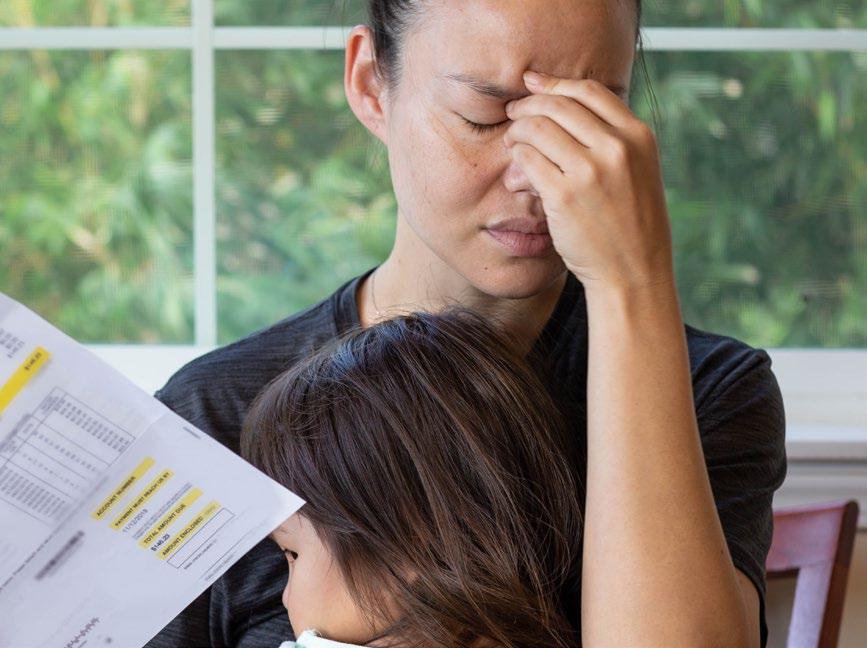

For more coping activities go to: https://helpandhopewv.org/coping/

This booklet is funded through a grant from the West Virginia Department of Health and Human Resources, Bureau for Behavioral Health.

INTRODUCTION
September 2023 Update
This booklet was originally developed in response to the COVID-19 pandemic. It was first published in September 2020 and updated in September 2021.
The pandemic left us with a greater awareness of the impact of stress and the importance of mental health. This booklet has been updated to focus on the effects of stress and healthy ways of managing mental health and wellness.
Current research shows that we are more stressed than ever. Many factors play into the increase in stress; including economic uncertainty, isolation from the pandemic and fewer outlets for stress relief. The good news is, we can learn about effective ways to deal with stress.
The intention of this booklet is to help you build a stronger understanding of your feelings and to build a coping toolkit. This booklet is meant to serve as a quick practical guide for stress. This booklet will provide activities and information that will help you learn about your emotions and reactions as you navigate challenging situations. We have included blank pages for you to make your own notes.

LEARNING ABOUT STRESS AND MENTAL HEALTH
Stress is normal and it happens to everyone. Sometimes stress can be good and help motivate us to accomplish important tasks. However, too much stress is not good and can affect our minds and bodies.
There are many things you can do to help alleviate stress in healthy ways. This booklet will offer different strategies to cope with stress - some you may already know and some that might be new.
Some of the signs that you may be overstressed include:
• You are struggling more than usual to keep up with the demands of work and home.
• You do not want to spend as much time with friends and family.
• Activities you used to enjoy are no longer fun.
• Your appetite and sleep patterns have changed. If you are noticing some of the changes listed above, it may help to reach out to someone else. Friends and family can often be helpful, as well as trained mental health counselors. You are not alone.
5 5

YOUR REACTIONS TO STRESS
It is normal to experience a lot of reactions to stress, including physical, mental, emotional, behavioral, and spiritual reactions. Some of these reactions are often physical. Which of the following have you experienced over the past year?
Please seek help if you are experiencing ANY reactions that interfere with daily functioning. IF YOU NEED IMMEDIATE ASSISTANCE, CALL 911.
6
YES NO Physical Reactions to Stress
Stomachaches or intestinal upsets
Headaches or other physical pains that have no clear reason
Jumpiness or being easily startled
Changes in your energy and activity levels
Changes in sleep patterns - trouble falling asleep, staying asleep, sleeping too much or too little
Difficulty relaxing
My Physical Reactions
List some of the PHYSICAL REACTIONS you have experienced that relate to stress.
7

PHYSICAL HEALTH
Take Good Care of Your Body

• Attend to your medical needs
• Make sure you are getting enough sleep
• Breathe fully and deeply
• Exercise – walk, stretch, dance
• Eat healthy foods – limit alcohol
Use the space below to identify additional strategies that fit for you.
8
Mental Reactions to Stress
YES NO
Forgetfulness
Isolation
Trouble thinking clearly and concentrating
New fatigue and confusion
Worrying about that which doesn’t affect you directly
My Mental Reactions
List some of the MENTAL REACTIONS you have experienced that relate to stress.
9


MENTAL HEALTH
Take Good Care of Your Mind
• Stay grounded – notice what you see, hear, smell, taste and touch
• Pace yourself - try to focus on what you can do today
• Limit the amount of time you spend on news/social media – consider official sources for news
• Go outside and spend some time with nature – take a hike in the woods, go to a lake, take a drive to the mountains, etc.
Use the space below to identify additional strategies that fit for you.
10
Emotional Reactions to Stress
YES NO
Anxiety
Fear
Sadness and depression
Irritability and anger
Guilt
Feeling overwhelmed
Feeling numb
My Emotional Reactions
List some of the EMOTIONAL REACTIONS you have experienced that relate to stress.
11


EMOTIONAL HEALTH
Take Good Care of Your Feelings
• Acknowledge your feelings
• Talk to someone you trust about how you are feeling
• Practice mindfulness
• Give yourself permission to have negative feelings
Use the space below to identify additional strategies that fit for you.
12
Behavioral Reactions to Stress
YES NO
Increased use of alcohol, tobacco, illegal drugs, prescription medication
Increased gambling, online gaming
Changes in diet – increased consumption of “junk food”
Hypervigilance
Lack of motivation for school, work
Difficulty coping
Thoughts of suicide
Increased domestic violence and child abuse
My Behavioral Reactions
List some of the BEHAVIORAL REACTIONS you have experienced that relate to stress.
13

BEHAVIORAL HEALTH
Take Good Care of Your Actions

• Check in with friends and family - try not to become isolated
• Listen to your favorite music
• Savor a cup of coffee or tea
• Be patient and forgiving with othersthey may be having a difficult time, too
• Set boundaries - remember that it’s OK to say “no”
• Whenever possible, try to laugh
Use the space below to identify additional strategies that fit for you.
Spiritual Reactions to Stress
YES NO
Loss of hope
Loss of purpose
Loss of connection
My Spiritual Reactions
List some of the SPIRITUAL REACTIONS you have experienced that relate to stress.


SPIRITUAL HEALTH
Take Good Care of Your Soul

• Pray or meditate
• Practice kindness and forgiveness
• Focus on what truly matters
Use the space below to identify additional strategies that fit for you.

What Can You Do?
One of the things that makes stress so hard is that it feels like you don’t have control. Now you know that there are many things you can do to help when you feel stressed. In the pages that follow, you will find suggestions for managing your stress.
Sleep
One of the most important things you can do to deal with stress is to get good sleep! Sleep helps your body calm down. When you get good sleep you are usually in a better mood the next day and it becomes easier to stay focused on tasks.
Do Fun Things with Friends and Family
Sometimes when you are stressed you may not feel like hanging out with your friends and family. However, spending time and having fun with the people you care about usually helps to improve your mood.
Talk to Someone Who Cares
Everyone needs someone to talk to! It can be helpful to talk to a trusted friend or family member. Sometimes it is best to reach out to a trained mental health professional for support.
Make a Plan
Stress comes and goes and is a normal part of life. You can’t avoid stress but you can make a plan for it. If you have a plan for stress, you are more likely to use your coping strategies the next time you feel stressed!
17

Identifying and Acknowledging Feelings
How intense are your feelings? Sometimes we feel just a little bit of a feeling and sometimes we feel a lot of a feeling. This is normal! Sometimes you may have two feelings at the same time. You may be feeling proud and happy because your child graduated from high school but sad that they are leaving to go to college or start a new job. This is called mixed feelings. The intensity of your feelings can go up and down throughout the day. It is good to notice how you are feeling so that you can address your feelings.
18
Mind Body Connection
Have you ever noticed a connection between your mind and body? When you are experiencing anxiety or depression, you may notice pain or unusual sensations in your body. Sometimes paying attention to how your body feels can help you to identify your emotions.
Notice where the feeling of worry may show up in your body.
Sweaty Hands
Tears
Headache Tense Shoulders
Butterflies in Stomach Fast Heartbeat
19
Shaking Knees
Breathing Styles and Exercises
Schedules are often demanding and life can become overwhelming at times! Did you know that sometimes just paying attention to your breathing can help you learn to manage your stress levels and find balance throughout a tremendously busy schedule? The practice of breath work is called pranayama, and it can help calm your mind simply by focusing on your breath. Deep breathing can actually have a physical effect on your body that helps you to transition from “fight, flight, or freeze” mode into a calmer state of being.

Practice each of the breathing exercises on the next page. Once you’ve practiced them, try incorporating them into your life. Try practicing any of these techniques when you are anxious, nervous, or having trouble falling asleep. Notice how focusing on the breath throughout the day changes your mood and perspective on things.
20
Breathing Styles and Exercises
Bhramari (Bumble bee breath): Find a comfortable seat, close your eyes and cover your ears. Inhale through your nose and then quietly hum as you exhale. You will feel vibrations in your head, calming the nervous system. Doing a few rounds of this before bedtime can help with better sleep.
Nadhi Sodhana (Alternate nostril breathing): You can do this breath sitting or lying down. Using the thumb of your dominant hand, block your right nostril and inhale deep into your belly through your left nostril only. Now block your left nostril with your ring finger and exhale through your right nostril. Pause briefly before inhaling through only your right nostril this time. Release your ring finger and block your right nostril, exhale through only your left nostril. A complete cycle of breath includes an inhalation and exhalation through both nostrils. Do up to ten cycles and notice how you feel after. This type of breathing increases the amount of oxygen taken into the body, which helps calm the mind, reduce stress, and promote concentration.

21
Mindfulness
Mindfulness is something that can help us when our reactions to stress become unmanageable. It is easy to allow the past and future to compromise our state of mind. Mindfulness is being aware and focusing all of your attention on the present moment.

You can do this activity inside or outside. If the weather is nice, go outside for a change of scenery!
As you notice each of the things below, see if you can focus on all of them simultaneously.
Notice what you see
Notice what you smell
Notice what you hear
Notice what you can touch
Notice what you taste
22
What is Yoga?
Yoga is a practice that means “to yoke” or “to join” the mind, body, and spirit so we are able to experience more calm and peace within our lives. Check out some other benefits of yoga below!
Increases body awareness and mindfulness
Improves emotional regulation and reduces anxiety
Enhances concentration and memory
Helps develop strength and flexibility
Boosts self-esteem and confidence
Helps you learn to let go and have fun!
23
Yoga Practice
IMPORTANT THINGS TO CONSIDER
Use props whenever you need to make yourself more comfortable in a pose! If you don’t have blocks, bolsters, or a mat – don’t worry! There are a lot of other items you can use such as blankets, pillows, books, etc.
Be cautious while practicing the postures. Your yoga practice is for you and no one else, so you have nothing to prove! Listen to your body and do not do anything that hurts.
We all experience different feelings and emotions throughout the day. It is important to check in with ourselves and notice how we are feeling. We can then honor these feelings.
You can do different yoga poses that relate to how you are feeling! Pick which sequence listed on the following page better meets how you are currently feeling and give it a try. Whichever sequence you try, take a moment afterwards to notice any changes.

Sequence 1: Feeling energized and motivated!? Try moving through all the poses shown below. When you go through the whole sequence it is called a Sun Salutation.

Sequence 2: Feeling tired, down, or overwhelmed? Try out the following poses. Hold each pose for as long as you wish.
Child’s Pose
Legs Up the Wall
Optional: Put a pillow under your head and cover yourself with a blanket.
25
Coping Toolkit
Use this page to make a plan for the next time you are feeling stressed.

Supportive people I can reach out to: (For example: a friend, family member, co-worker)
Fun things I like to do to get my mind off stress: (For example: go outside, do puzzles)
Coping strategies I like to use when I am stressed: (For example: deep breathing, yoga)
26
27 27
RESOURCES
RESOURCES
Help & Hope WV
www.HelpandHopeWV.org
This website is an educational and resource-rich website that includes links to many of the resources listed below.
RESOURCES WITH LIVE HELPLINES

HELP4WV
help4wv.com
1-844-HELP4WV (1-844-435-7498)
Provides immediate help for those struggling with addiction or mental health issues.
HELP4WV features 24-hour access to call, text, and chat. It also has a searchable online resource directory and a direct line for children’s crisis services.

988 Suicide & Crisis Lifeline
988lifeline.org
Call, text, or chat 988
Provides 24/7, free and confidential support for people in distress, prevention and crisis resources for you or your loved ones, and best practices for professionals.
We can all help prevent suicide.
RESOURCES


The Lifeline provides 24/7, free and confidential support for people in distress, prevention and crisis resources for you or your loved ones, and best practices for professionals.

29

Ask Questions
We hope you have learned some new skills that will help you deal with uncomfortable feelings. Even though stress challenges us all, there are things we can do to deal with it. Keep this booklet so you can use it when you need extra help dealing with stress.
Special thanks to the writers and reviewers of this booklet!
Megan C. Phillips, MSW, Licensed Clinical Social Worker - writer
Katarina Candee, BMDS, Registered Yoga Teacher, 200 hours (RYT 200) - writer
Martha Minter, MSW, Licensed Clinical Social Worker - writer
For further reading, please see:
Levine, P. (2010). In An Unspoken Voice: How the Body Releases Trauma and Restores Goodness. North Atlantic Books, Berkeley, CA.
Resources
Additional
and Notes

































